Abstract
When the stick insect walks, the middle and rear legs step to positions immediately behind the tarsus of the adjacent rostral leg. Previous reports have described this movement to a target as a relationship between the tarsus positions of the two legs in a Cartesian coordinate system. However, leg proprioceptors measure the position of the target leg in terms of joint angles and leg muscles bring the tarsus of the moving leg to the proper end-point by establishing appropriate angles at the joints. Representation of this task in Cartesian coordinates requires non-linear coordinate transformations; realizing such a transformation in the nervous system appears to require many neurons. The present simulation using the back-propagation algorithm shows that a simple network of only nine units — 3 sensory input units, 3 motor output units, and 3 hidden units — suffices. The simulation also shows that an analytic coordinate transformation can be replaced by a direct association of joint configurations in the moving leg with those in the target leg.
Similar content being viewed by others
References
Barto A, Sutton RS, Anderson CW (1983) Neuronlike adaptive elements that can solve difficult learning control problems. IEEE Trans SMC 13:834–846
Brady M, Hollerbach JM, Johnson TL, Lozano-Perez T, Mason MT (1982) Robot motion: planning and control. MIT Press, Cambridge, Mass
Cowan JD, Sharp DH (1988) Neural nets. Quart Rev Biophys 21:365–427
Cruse H (1976) The function of the legs in the free walking stick insect, Carausius morosus. J Comp Physiol 112:235–262
Cruse H (1979) The control of the anterior extreme position of the hindleg of a walking insect, Carausius morosus. Physiol Entomol 4:121–124
Cruse H (1990) What mechanisms coordinate leg movement in walking arthropods? TINS 13:15–21
Cruse H, Dean J, Suilmann M (1984) The contributions of diverse sense organs to the control of leg movement by a walking insect. J Comp Physiol A154:695–705
Dean J, Wendler G (1983) Stick insect locomotion on a walking wheel: Interleg coordination of leg position. J Exp Biol 103:75–94
Kaweta M, Furakaw K, Suzuki R (1987) A hierarchical neural/network model for control and learning of voluntary movement. Biol Cybern 57:169–185
Kohonen T (1988) An introduction to neural computing. Neural Networks 1:3–16
McClelland JL, Rumelhart DE (1988) Explorations in parallel distributed processing. A Handbook of models, programs, and exercises. MIT Press, Cambridge, Mass
Mountcastle VB (1967) The problem of sensing and the neural code of sensory events. In: Quarton GC, Melnechuk T, Schmitt FO (eds) The neurosciences, a study program. Rockefeller University Press, New York, pp 393–408
Ritter H, Schulten K (1988) Extending Kohonen's self-organizing mapping algorithm to learn ballistic movements. In: Eckmiller R, Malsburg Ch vd (eds) Neural computers. NATO ASI Series, Vol F41. Springer, Berlin Heidelberg New York, pp 393–406
Schoonhoven LM, Blom F (1988) Chemoreception and feeding behaviour in a caterpiller: towards a model of brain functioning in insects. Entomol Exp Appl 49:123–129
Author information
Authors and Affiliations
Rights and permissions
About this article
Cite this article
Dean, J. Coding proprioceptive information to control movement to a target: Simulation with a simple neural network. Biol. Cybern. 63, 115–120 (1990). https://doi.org/10.1007/BF00203033
Received:
Accepted:
Issue Date:
DOI: https://doi.org/10.1007/BF00203033
